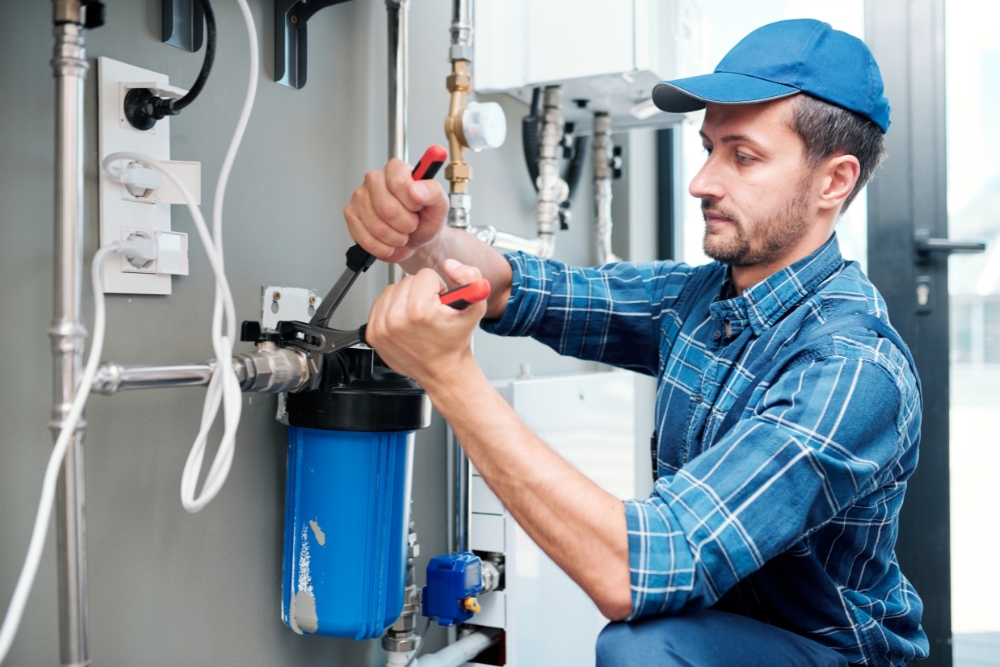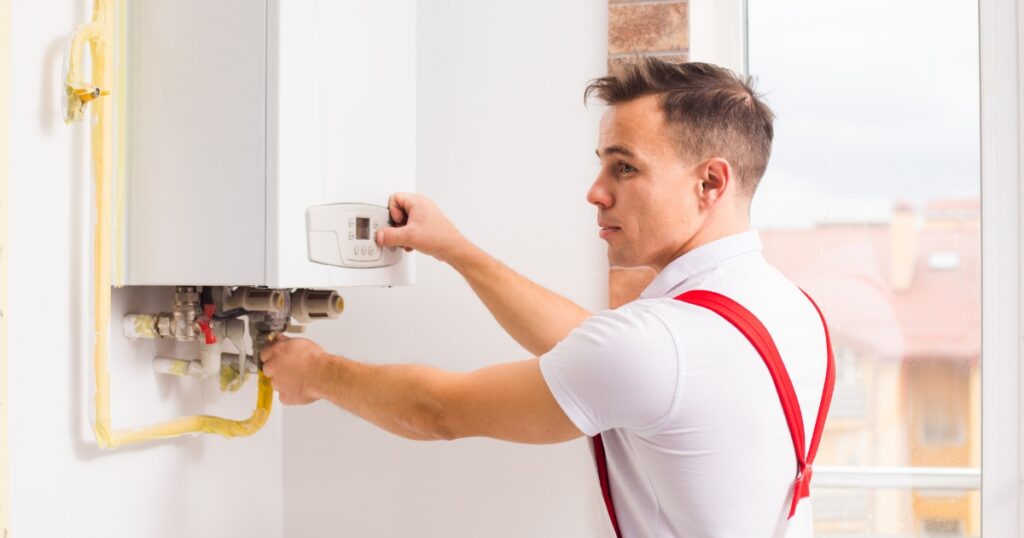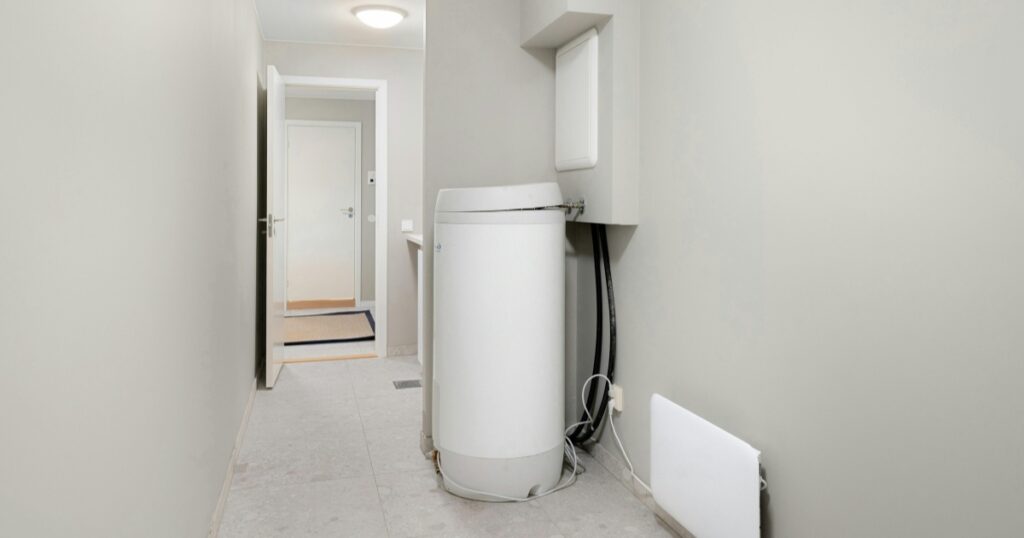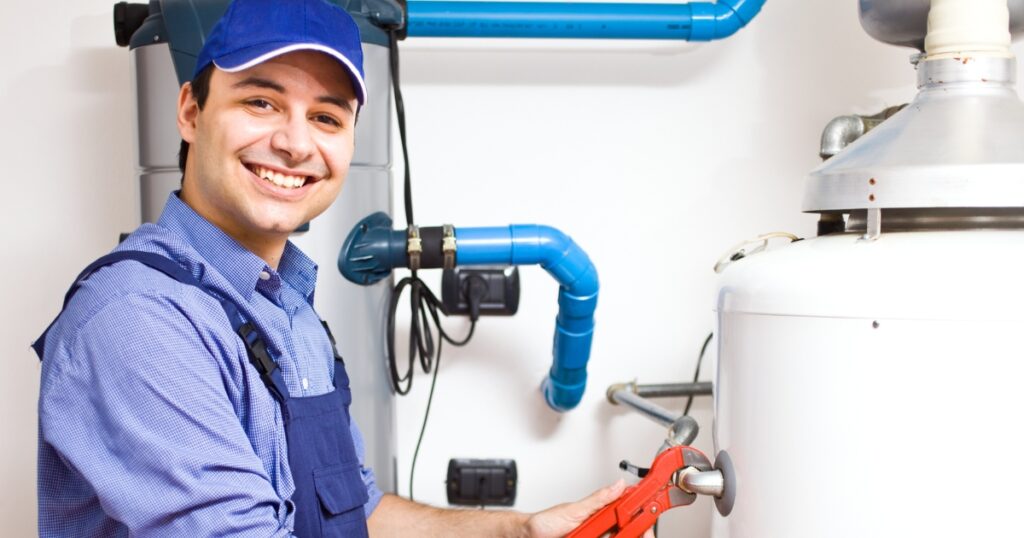Ever had that heart-sinking moment when you stepped into a puddle near your water heater? Yeah, we get it. There’s nothing quite like the soggy surprise of a leak to start your day off on the wrong foot.
So don’t stress — we’ve got your back with some easy-to-follow advice! Keep reading for our no-fuss guide that’ll help you keep your home snug as a bug and bone dry—no need for a tradie licence!
Key Takeaways
- Regularly inspect your hot water system for deteriorated fittings, corrosion, and signs of wear to prevent leaks before they become bigger problems.
- Keep an eye on the water pressure in your home; too much pressure can strain the system and cause leaks, so you may need a professional plumber to install a pressure-reducing valve.
- Flush out sediment from your hot water tank annually and check the pressure relief valve periodically to keep everything running smoothly.
- If you spot any signs of a leak, turn off the water supply immediately and call an emergency plumber for quick repairs or consider replacing the unit if necessary.
- Stay proactive with maintenance checks and consult with plumbing services regularly to ensure your hot water system is functioning properly without risking damage or safety hazards.
The Dangers of a Leaking Hot Water Heater
A leaking hot water system can lead to potential damage and costs, as well as safety hazards. It is important to address these leaks promptly to prevent further issues.
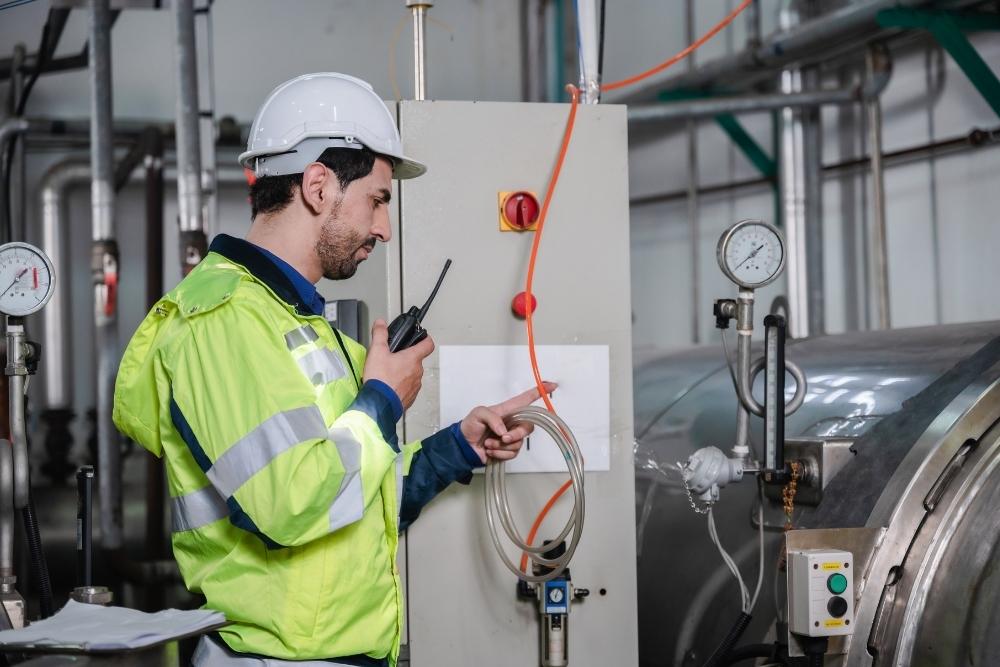
Potential damage and costs
Let’s face it, leaks in water heater systems can hit our wallets hard. If we leave them unaddressed, the damage adds up quickly. It could start with soaked carpets or warped floorboards and lead to major structural issues around the house.
And it’s not just about fixing surfaces; electrical hazards and mould growth are costly problems that often follow a leaking water tank.
We’ve got to think about energy efficiency too. A malfunctioning hot water system works overtime to keep the water warm, ramping up power bills without us realising it until we see the numbers on our energy statements.
Getting these leaks sorted pronto by calling in plumbing services can save us from shelling out for high repair bills or even higher utility costs down the line.
Safety hazards
Leaking hot water systems can pose serious safety hazards in homes. Water leaks can lead to the accumulation of moisture, creating a breeding ground for mould and mildew which pose health risks to occupants.
Additionally, the pooling water from leaks can result in slippery surfaces, increasing the risk of falls and injuries. If electrical components come into contact with the leaked water, there is also an increased risk of electric shocks or short circuits.
Corrosion and rust caused by leaking hot water systems can compromise the structural integrity of flooring and walls over time, leading to potential collapses or property damage. Furthermore, if left unaddressed, leaks may negatively impact other home appliances such as air conditioners or HVAC units that are located near the water heater system.
Causes of Hot Water System Leaks
Hot water system leaks can be caused by deteriorated fittings, excessive water pressure, corrosion and rust, wear and tear, as well as improper installation or maintenance. These issues can lead to costly damage and safety hazards if not addressed promptly.
Deteriorated fittings
Deteriorated fittings can cause leaks in hot water systems. The corrosion and wear on the fittings may lead to water escaping from the connections, resulting in a potential hazard and damage.
Regular inspection of fittings is essential to identify any signs of deterioration early on and prevent leaks before they occur. Proper maintenance and timely replacement of deteriorated fittings are crucial for ensuring the efficient operation of your hot water system.
Addressing deteriorated fittings promptly is key to preventing extensive damage and costly repairs. Engaging professional plumbers for regular inspections can help detect any signs of wear or corrosion in the fittings, allowing you to take necessary action before a leak occurs.
Excessive water pressure
Excessive water pressure can put a strain on your hot water system, leading to leaks and potential damage. High water pressure can cause fittings to weaken and joints to loosen, resulting in leaks.
It’s essential to monitor your home’s water pressure regularly using a pressure gauge and ensure it stays within the recommended range. If you notice the pressure is consistently high, contact a professional plumber to install a pressure-reducing valve.
This simple solution can prevent excessive water pressure from damaging your hot water system and causing costly leaks.
Corrosion and rust
After addressing excessive water pressure, it’s important to consider the impact of corrosion and rust on hot water systems. Over time, metal components can deteriorate due to exposure to water and moisture, leading to the development of rust and corrosion in pipes, fittings, and tanks.
This can weaken the structural integrity of the system and result in leaks or even complete failure. Regular maintenance and inspections are essential for identifying early signs of corrosion, allowing for timely repairs or replacements to prevent extensive damage.
Proactive measures such as installing sacrificial anode rods can also help mitigate the effects of corrosion by attracting corrosive elements before they affect vital components. Engaging a professional plumber for thorough inspections at regular intervals is crucial in ensuring that any signs of rust or corrosion are dealt with promptly, preventing costly repairs or replacements down the line.
Wear and tear
Over time, components of the hot water system can naturally wear down. The constant heating and cooling of the water in the tank can cause deterioration of fittings, leading to potential leaks.
Corrosion and rusting may also occur as a result of wear and tear on the internal parts of the system. Regular maintenance and inspections are crucial to identify early signs of wear and tear to prevent potential leaks or malfunctions.
By addressing wear and tear issues promptly, you can avoid costly repairs or replacements in the future. It’s essential to stay proactive in maintaining your hot water system to ensure it remains efficient and leak-free for years to come.
Improper installation and maintenance
Improper installation and maintenance significantly contribute to hot water system leaks. Poorly installed fittings or connections can lead to leaks, especially in areas with high water pressure.
Regular maintenance is crucial to prevent corrosion and rust from causing leaks, which can be easily avoided with timely inspections and repairs by a professional plumber.
Ensuring proper installation and regular maintenance of your hot water system is essential for preventing costly leaks and damage. These measures can also extend the lifespan of your water heater, providing you with reliable hot water when you need it most.

How to Address and Prevent Hot Water System Leaks
Identifying the leak and turning off the water is crucial to prevent further damage. Contacting a professional plumber for prompt repairs or replacement and maintaining your hot water system with regular inspections can help prevent future leaks.
Identifying the leak and turning off the water
To address a hot water system leak, it’s crucial to first identify the location of the leak. Start by turning off the water supply to prevent further damage and reduce the risk of accidents. Once the water is switched off, you can assess the situation more safely.
- Carefully inspect all visible parts of the hot water system for any signs of leakage, such as pooling water or dampness.
- Check for any unusual sounds or hissing coming from the system, which could indicate a leak in a pipe or valve.
- Look for areas where corrosion or rust has developed on the system, as this could be a sign of a potential leak point.
- Note any sudden drops in water pressure as this might also signal a leak within your hot water system.
- If you see any visible signs of leaks or suspect a hidden one, call an emergency plumber immediately for professional assistance.
Contacting a professional plumber
If you notice a leak in your hot water system, it’s crucial to contact a professional plumber promptly. A qualified plumber has the expertise to accurately diagnose the issue and provide effective solutions.
They can also ensure that any repairs or replacements are carried out safely and efficiently, helping you avoid further damage and costs in the long run.
When addressing leaks in water heater systems, reaching out to a professional plumber is essential for ensuring that the problem is resolved promptly and professionally. With their knowledge and experience, plumbers can identify the root cause of the leak and recommend the most suitable course of action to address it.
Consider repairs or replacement
When facing hot water system leaks, it’s crucial to consider repairs or replacement as a viable solution. Identifying the extent of the damage and consulting with a professional plumber will help determine whether a repair can sufficiently address the issue or if replacing the unit is necessary for long-term reliability.
Proper maintenance and regular inspections can aid in avoiding major leaks, but when faced with persistent issues, opting for repairs or replacement ensures efficient functioning and peace of mind.
Regular maintenance and prompt repairs are essential in managing hot water system leaks effectively. Consulting with a reputable plumbing service allows for expert assessment of potential repairs or need for replacement, ensuring that your hot water system functions reliably without risking further damage or safety hazards.
Proper maintenance and regular inspections
To maintain your hot water system and prevent leaks, it’s crucial to conduct routine inspections and ensure proper maintenance is carried out. To achieve this, focus on the following:
- Schedule regular maintenance checks for your hot water system to detect any signs of wear, corrosion, or deterioration early on.
- Inspect the pressure relief valve periodically to ensure it’s functioning correctly and release any excessive pressure build-up.
- Flush out sediment build-up from the hot water tank at least once a year to prevent blockages and prolong the lifespan of the system.
- Check for any leaks or drips in the system and address them promptly to prevent further damage or potential flooding.
- Keep an eye on the temperature settings and adjust them according to seasonal changes to optimise efficiency while avoiding overheating issues.
Address Hot Water Heater Systems Issues
In conclusion, identifying and addressing leaks in hot water systems promptly is crucial to preventing further damage. Contacting a professional plumber as soon as the leak is discovered can help resolve the issue efficiently.
Regular maintenance and inspections are essential for preventing future leaks and ensuring the system operates smoothly. Don’t hesitate to consider repairs or replacement if needed, to ensure your hot water system functions effectively without any leaks causing inconvenience.
Taking swift action when dealing with hot water system leaks can save you from potential safety hazards and costly damages in the long run.

